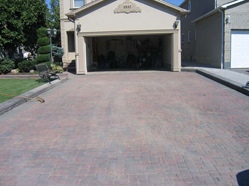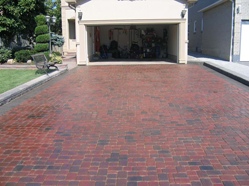FENCE AND DECK STAININGQ: Is my fence or deck gray because it's old?
A: No. The gray on a fence or deck is mould. A new fence or deck will turn gray within 1 year if not properly protected. Q: Why shouldn't I just paint my fence or deck?
A: This is the number one misconception homeowners have. Painting a fence or deck is the worst thing you could do. Q: Do you protect my landscaping, pool and landscaping?
A: Yes! We go to great measures to cover and protect your landscaping, pool and boulders, patio, etc. However, some overspray may occur on your grass near the bottom of your fence. This is normal and will disappear in a few weeks. PATTERN CONCRETE SEALINGQ: Can oil stains on a pattern concrete be removed?
A: If the oil has not penetrated into the concrete due to a lack of sealer, they can. If the oil has penetrated, it will be virtually impossible to get rid of the stain. Q: How often should a stamped concrete be sealed?
A: For pattern concrete driveways every 2 years, walkways and patios every 3 to 4 years. Q: Is it better then to just reseal every year?
A: No, it is not necessary and it is a waste of money. Sealing every year will cause moisture build up and will cause the pattern concrete to form a white haze. INTERLOCK BRICK SEALINGQ: What benefits will I get out of cleaning and sealing my interlocking bricks?
A: Regular cleaning and sealing will keep your interlocking bricks looking just as they were when you first purchased them. They will keep their beautiful look and their colour will intensify if sealed regularly. Q: How long do I need to wait before I can seal my interlocking bricks?
A: As a rule of thumb we suggest waiting 90 to 120 days. This allows any efflorescence to come out and weather away naturally. If you have a lot of rainfall in the spring, 90 days should suffice. Q: What are the advantages of sealing my interlocking bricks?A: Sealers offer three advantages: they help resist stains, enhance the color, and bind the sand in the joints to make it difficult for weeds to germinate. Sealers, however, are topical products and must be reapplied regularly. ASPHALT SEALINGQ: How often should I seal my driveway?
A: We recommend that you seal your driveway every two years. However, many of our customers seal their driveways on a yearly basis. Q: How long should I stay off my driveway after the sealer is applied?
A: You should stay off your driveway for a minimum of 24 hours before you drive on it. If your driveway receives a lot of sunlight then after 4 hours you could walk on it if needed to. In shady areas you must wait at least 6 hours for foot traffic. Q: What does asphalt sealing do?A: Asphalt sealing protects your driveway from environmental deterioration as well as petrochemicals from leaking vehicles. Sealing prolongs the life of your asphalt and enhances the appearance of your property. |
ENHANCING YOUR PROPERTY


|
Cleaning, Sealing and Staining is our business!
Cleaning, Sealing and Staining is our business!
BEFORE AFTER

